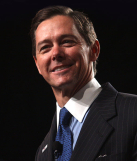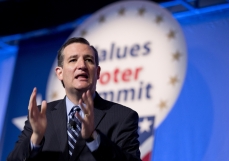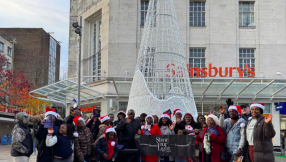A row in the Texas city of Houston over a move by the city authorities to subpoena copies of church sermons has led to an intervention by Presidential hopeful, Republican Senator Ted Cruz.
The sermons are required by the city as evidence as evidence for the defence in a case brought against it by conservative activists.
However, Mr Cruz, who is believed to be building support for a presidential run in 2016 and has identified "threats to constitutional liberties" as an election issue, said at a press conference at Houston's First Baptist Church, "Caesar has no jurisdiction over the pulpit, and when you subpoena one pastor, you subpoena every pastor."
The unlikely confrontation is over a piece of anti-discrimination legislation officially entitled the Houston Equal Rights Ordinance (HERO) but widely known as the Bathroom Bill.
According to campaigners, who include many conservative ministers of religion, the Bill – which outlaws discrimination against transgendered and inter-sex people among others – means that transgendered men who wish to use women's lavatories could claim discrimination if they were forbidden from doing so. Passed in May, it has been the subject of a determined attempt to repeal it even though certain categories of building, including religious buildings, are exempt.
Houston's Mayor Annise Parker, who has been active in promoting gay rights, has been the focus of sharp attacks by conservatives. A group of Christians sued the city for failing to accept petitions against the Bill, whereupon its attorneys issued subpoenas to five pastors ordering them to hand over "all speeches, presentations, or sermons related to HERO, the Petition, Mayor Annise Parker, homosexuality, or gender identity prepared by, delivered by, revised by, or approved by you or in your possession".
Janice Evans, chief policy officer to the mayor, said the subpoena was "part of the discovery process in a lawsuit brought by opponents of the ordinance, a group that is tied to the pastors who have received the subpoenas".
She added in a statement: "The pastors made their sermons relevant to the case by using the pulpit to do political organising. This included encouraging congregation members to sign petitions and help gather signatures for equal rights ordinance foes. The issue is whether they were speaking from the pulpit for the purpose of politics. If so, it is not protected speech."
In the minds of many conservatives, the issue has now broadened to encompass questions of fundamental religious freedoms. However, in a radio interview, city attorney David Feldman called the outcry over the subpoenas "ridiculous," adding: "It's unfortunate that it has been construed as some sort of effort to infringe upon religious liberty."
Now a legal campaign group, the Alliance Defending Freedom, has filed a motion to put a stop to the subpoena, saying: "These requests, if allowed, will have a chilling effect on future citizens who might consider circulating referendum petitions because they are dissatisfied with ordinances passed by the City Council. Not only will the Nonparty Pastors be harmed if these discovery requests are allowed, but the People will suffer as well."















